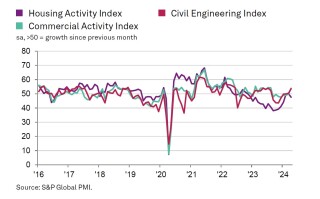While house-building once again slowed in April 2024, growth in both civil engineering and commercial construction more than made up for it.
At 53.0 in April, up from 50.2 in March, the headline S&P Global UK Construction Purchasing Managers’ Index (PMI) – a seasonally adjusted index tracking changes in industry activity – registered in positive territory for the second month running and signalled the strongest pace of expansion since February 2023.
Commercial building (index at 53.9) increased for the first time since August 2023 and was the fastest-growing area of construction activity in April. Survey respondents commented on rising workloads and a turnaround in customer demand, in part driven by refurbishment projects.
Civil engineering activity (index at 53.6) also expanded again in April and at its strongest pace for nine months.
House-building, however, scored 47.6 – anything below 50 indicates negative growth – its worst score since January. Survey respondents again commented on sluggish market conditions and the impact of mortgage interest rates.
New business volumes increased for the third successive month in April, although the rate of expansion eased since March and was only modest. Those reporting higher new order intakes typically cited improved client confidence, particularly in the commercial sector.
Despite sustained rises in output and new work, the latest survey pointed to another marginal reduction in employment numbers. Lower staffing levels were often linked to the non-replacement of voluntary leavers, due to cost pressures and the completion of major projects.
Demand for construction products and materials softened for the eighth consecutive month in April, the survey found. Lower input buying was partly attributed to destocking. Supplier performance meanwhile improved at the fastest pace since December 2023.
Purchasing prices rose only modestly in April, with construction firms noting that suppliers were looking to pass on greater wage bills and transportation costs. However, the overall rate of cost inflation was only modest and well below the long-run survey average.
Finally, optimism regarding the year-ahead business outlook edged up in April. Nearly half of the survey panel anticipate a rise in output during the next 12 months, while only 11% forecast a decline. Survey respondents mostly commented on improving sales enquiries and more positive signals for customer demand, alongside hopes of interest rate cuts in the latter half of 2024.

Tim Moore, economics director at S&P Global Market Intelligence, which compiles the survey, said: “The construction sector consolidated its recent return to growth in April, with total industry activity rising at the fastest pace for 14 months amid an ongoing recovery in order books. Demand was boosted by greater confidence regarding the broader UK economic outlook. Commercial construction outperformed in April and civil engineering also provided a solid contribution to overall growth.
“Lacklustre market conditions in the house building segment continued to weigh on activity. The latest survey pointed to the fastest reduction in residential building work since January, although the speed of the downturn remained much softer than in the second half of 2023.
“Hiring trends were subdued in April despite a recovery in workloads, which mirrored trends seen in other part of the UK economy, as construction firms sought to maintain a tight focus on costs against a backdrop of strong wage pressures. Purchasing prices nonetheless increased only modestly in April. An improved balance between supply and demand helped to contain overall input cost inflation, as suggested by the fastest improvement in vendor performance so far in 2024.
“Business activity expectations for the year ahead picked up slightly in April, supported by a sustained recovery in new orders, positive signals for sales pipelines, and anticipated interest rate cuts in the second half of 2024.”
Aecom head of cost management Brian Smith said: “A second month at or above 50 and continued improvement since December demonstrates some resilience to the sector, despite the overall stuttering economy and poor weather.
“However, the outlook remains uncertain for the industry-at-large. We expect the new work volume trend to be flat or downwards this year, especially while interest rates remain elevated for private developers and the upcoming election diverts attention from public sector project delivery.
“Repair & maintenance work will remain a reliable source of revenue but filling order books with longer-term contracts remains a priority, as firms look to strengthen their pipeline of work and bolster their balance sheet.”
Got a story? Email news@theconstructionindex.co.uk





